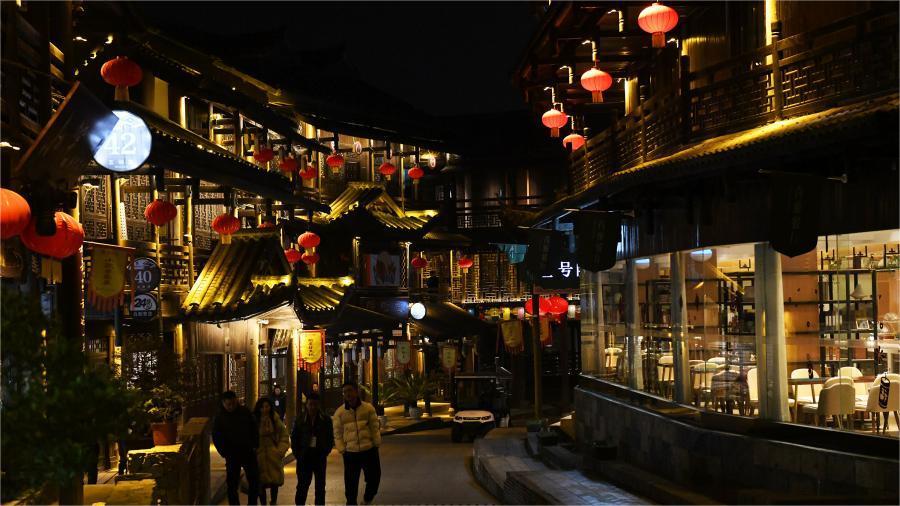Letter from China: Seeing the "city of the future"
BEIJING, March 1 (Xinhua) -- Back in 2010, when Shanghai hosted the World Expo, the theme of "Better City, Better Life" inspired dreamers from across the globe to look to the future. Over a decade later, in an area in northern China nearly three times the size of the land of New York City, a "city of the future" is rising.
My recent visit to Xiong'an New Area in Hebei Province, with its futuristic designs and innovative construction, was an eye-opener.
Driving south from Beijing on the Beijing-Xiong'an expressway, I was amazed by how bright and smooth, and well-equipped the road was. Lamps that automatically adjust brightness according to the weather and traffic flow, smart snow melting systems, and lanes for intelligent driving -- all these facilities suggest that I was on a road toward the "future."
After a journey of over 100 km, I arrived at Xiong'an. Look at this city: brand-new roads, residential buildings, office buildings, shopping malls and hotels; magnificent landmark architecture such as the business service center and the computing center... It's hard to believe that not long ago, this area was rural land.
In April 2017, China decided to establish the Xiong'an New Area, part of a strategy to promote the coordinated development of the Beijing-Tianjin-Hebei region. Xiong'an was designed to be a smart and livable city that is innovative, green and free from "urban ills."
Driving down a main road in Rongdong district, all the traffic lights I met were green! Later on, my colleague told me that it was because the road was installed with a system that collected data about the traffic conditions and controlled the timing of the traffic lights accordingly.
"As Xiong'an is building a physical city, a digital city is also growing together," said Yuan Xiaodong, with Xiong'an Cloud Networking Technology Co., Ltd.
The Xiong'an city computing center, with its facade reminiscent of the shape of an eye, is considered the city's "brain." On a huge electronic screen, you can see real time data that tells you the city's operation in nearly all respects such as: Which road has more traffic? Anything unusual in the underground pipes? Are the neighborhood trash cans full?
Just across the road from the computing center, a robot barista is busy brewing coffee at Migu Cafe in the Xiong'an business service center. The coffee tasted no different from that made by humans, if not better.
Store manager Wang Ying said the "robotic coffee" was especially attractive to young people, and the cafe had sold 500 cups a day since it opened last October.
Inside the cafes of Xiong'an, you can easily see groups of young people talking business over a cup of coffee. My colleague told me that cafes here have become a paradise of inspiration for young entrepreneurs.
Currently, Xiong'an is developing industries including next-generation information technology, biomedical, and new materials, and has built more than 10 industrial innovation platforms. It is no wonder that the city has attracted many innovation-based enterprises.
Xu Mengchao, who runs a biotech business in Beijing, recently set up a branch in Xiong'an. He said the company's business is in line with Xiongan's development direction, and it offers lower start-up costs, more favorable policies and a good living environment.
The last point resonated with me. You see, Xiong'an is not only full of innovation, but also a green and livable city. Walking into Yuerong Park, the delicately designed green space brings to mind the beauty of ancient gardens.
"Plant green first, then build the city" is Xiong'an's guiding concept. In fact, local officials put it more vividly: create a blue-green interwoven space, and then gently "put" the city into it.
According to the urban planning outline, local citizens will need to walk no further than 300 meters from their homes to reach a park, a tree belt within 1 km, and a forest within 3 km.
During the trip, I also checked in on the rising tower of Sinochem Holdings, one of the main structures under construction. People said the work was pressing ahead so efficiently that the building was "growing" one floor every seven days.
Looking at the machines and people busy working at the construction site, I could not help but wonder what the "city of the future" will be like in one year's time. I am already looking forward to my next visit to Xiong'an.
Photos
Related Stories
- Comprehensive bonded zone of China's Xiong'an launches export business
- Coffee craze in China's "city of the future" brews up entrepreneurial spirit
- Construction of Xiong'an New Area in full swing
- Chinese firm eyes geothermal energy research hub in Xiong'an
- Unmanned delivery vehicles put into operation in N China's Xiong'an New Area
Copyright © 2024 People's Daily Online. All Rights Reserved.









